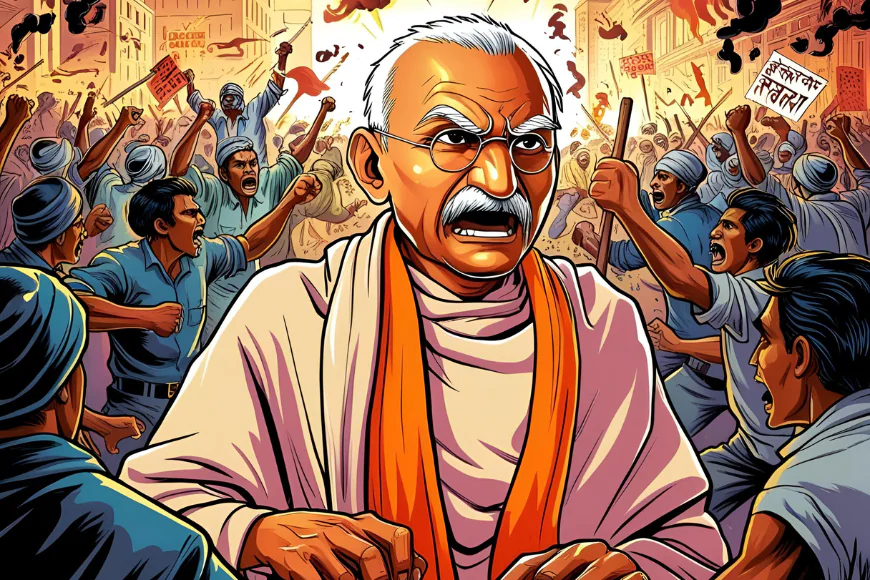Gandhi—When the Mahatma’s Halo Slipped
Gandhi: revolutionary, leader, and… well, not exactly the flawless icon we were sold on. Here’s a no-holds-barred look at the side of Gandhi they don’t cover in your history class.

Gandhi’s Problematic Views on Race
Before he became the poster child for equality, Gandhi’s early years in South Africa were, uh… not it. He referred to Black South Africans using words I can’t even print here, and argued that Indians were superior to them. Yikes, right? During his time in South Africa, he fought for Indian rights, but here’s the catch: he wasn’t fighting against racism in general—just racism aimed at Indians. The guy literally said, “Indians are better than this” while leaving Black South Africans out in the cold. Not exactly kumbaya vibes.
The Celibacy “Experiments”
Okay, buckle up, because this one’s weird. Gandhi was all about promoting celibacy (or “brahmacharya”), but his methods were... questionable, to say the least. He would sleep next to young women—sometimes naked—to “test his willpower.” No, seriously. He claimed it was to strengthen his spiritual discipline, but modern critics (and anyone with common sense) are like, “Dude, what?” The power dynamics in these so-called “experiments” make them even more uncomfortable, and it’s a part of Gandhi’s life that doesn’t get nearly enough scrutiny.
Gandhi and the Caste System: Half Measures
Gandhi opposed untouchability—cool, right? But hold your applause. While he wanted better treatment for Dalits (formerly untouchables), he didn’t actually reject the caste system as a whole. Instead, he pushed for a softer version of it, calling Dalits “Harijans,” or “children of God.” Sounds nice, but many Dalits found the term patronizing. Gandhi thought he was being progressive, but let’s be real: it’s like slapping a Band-Aid on a centuries-old wound.
Partition Chaos: The Fallout of Gandhi’s Vision
Gandhi dreamed of a united India, but what he got was partition—and it was a bloody nightmare. As India and Pakistan split in 1947, communal violence exploded, leaving millions dead or displaced. Gandhi tried to calm tensions by fasting (classic Gandhi move), but his efforts couldn’t stop the wave of destruction. To make it worse, some Hindus felt Gandhi was too sympathetic toward Muslims, which led to resentment—and eventually his assassination by a Hindu nationalist. Talk about a legacy drenched in irony.
His Early Love for the British Empire
Plot twist: Gandhi wasn’t always anti-colonial. In his younger days, he supported the British Empire and even organized an ambulance corps for them during the Boer War. He believed Indians could gain equality within the empire. Spoiler: That didn’t work out. While he later became a thorn in Britain’s side, this early allegiance is a head-scratcher for anyone picturing him as the anti-colonial OG from day one.
Controlling Behavior: Kasturba Deserved Better
Let’s talk about Gandhi’s wife, Kasturba. She was with him through thick and thin, but their marriage wasn’t exactly #CoupleGoals. Gandhi was known to be controlling, often forcing his dietary restrictions, celibacy practices, and other ideals on her. At one point, he even refused her medical treatment because it didn’t align with his philosophies. She passed away during one of his fasts, and the emotional toll of their relationship often gets overlooked.
So there you have it: Gandhi unmasked. He was a visionary, yes, but also a deeply flawed human with a laundry list of contradictions. By seeing the man behind the legend, we can appreciate his contributions without ignoring his shortcomings. Because let’s be real—nobody’s perfect, not even Gandhi.
What's Your Reaction?
 Like
0
Like
0
 Dislike
0
Dislike
0
 Love
0
Love
0
 Funny
0
Funny
0
 Angry
0
Angry
0
 Sad
0
Sad
0
 Wow
0
Wow
0































